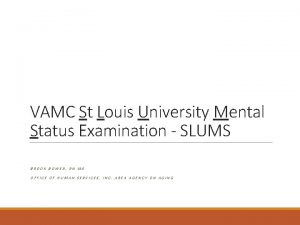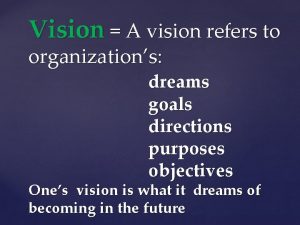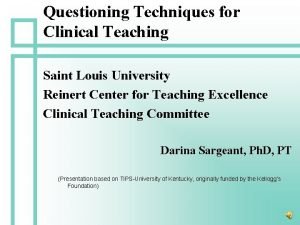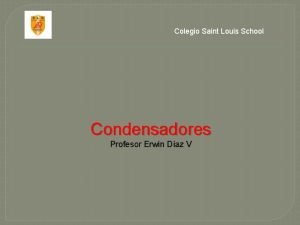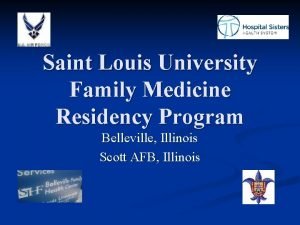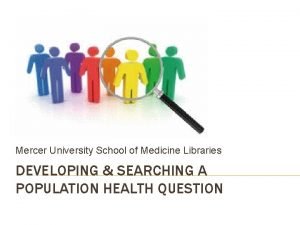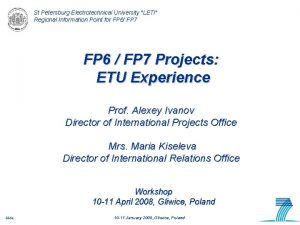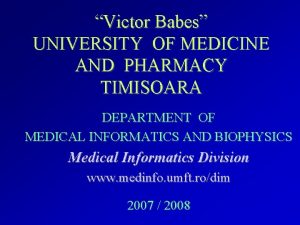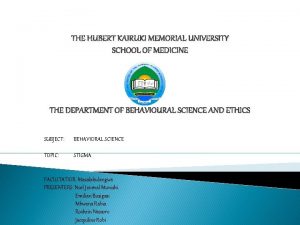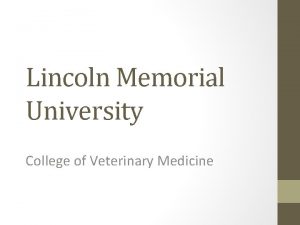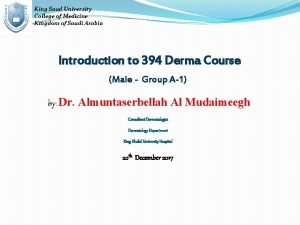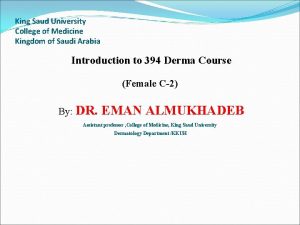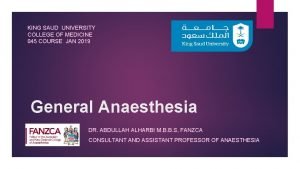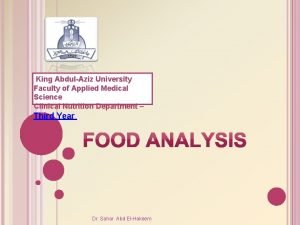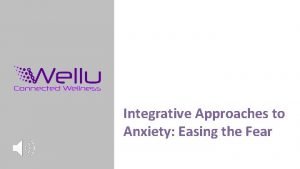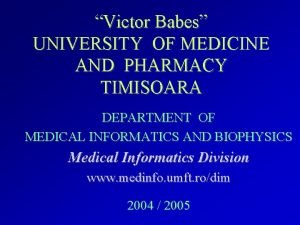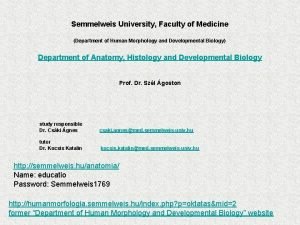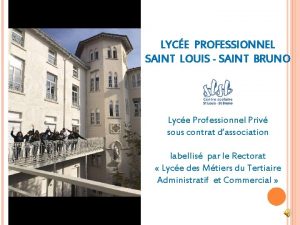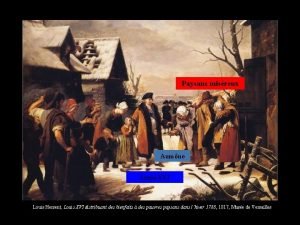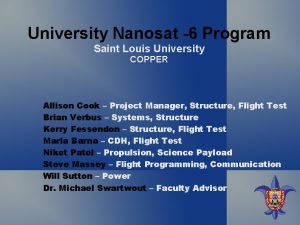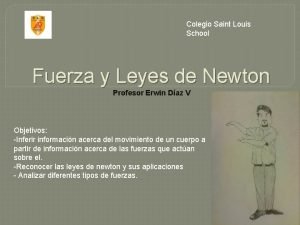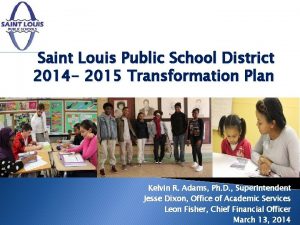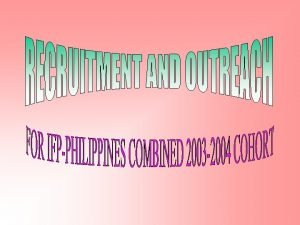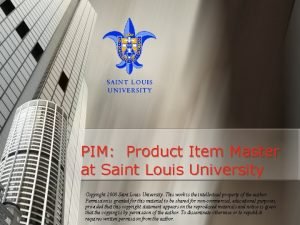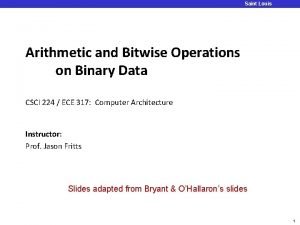Research at Saint Louis University School of Medicine



























- Slides: 27

Research at Saint Louis University School of Medicine Joel C. Eissenberg, Ph. D. Assoc. Dean-Research Paul Hauptman, M. D. Ass’t Dean-Clinical & Translational Research

Research Centers at Saint Louis University School of Medicine Foster cross-department collaboration Promote collaborations between basic and clinical researchers Five named Research Centers Cardiovascular Center (Dr. David Ford) Center for Excellence in Neurosciences (Dr. Thomas Westfall) Cancer Center (Dr. Mark Varvares) Liver Center (Drs. Bruce Bacon and Adrian Di. Bisceglie Vaccine Center (Dr. Robert Belshe)

Research Centers at Saint Louis University School of Medicine Foster cross-department collaboration Promote collaborations between basic and clinical researchers Five named Research Centers Cardiovascular Center (Dr. David Ford) Center for Excellence in Neurosciences (Dr. Mark Voigt) Cancer Center (Dr. Carl Freter) Liver Center (Drs. Bruce Bacon and Adrian Di. Bisceglie) Vaccine Center (Dr. Dan Hoft)

Center for World Health & Medicine at Saint Louis University http: //medschool. slu. edu/whm/

Center for World Health & Medicine at Saint Louis University Team of 12 research scientists formerly at Pfizer (and legacy companies), currently working in labs on the 3 rd floor of the DRC and 1 st floor of Schwitalla Hall Expertise in medicinal chemistry, drug design, pharmacokinetics Special focus on diseases of the developing world and orphan diseases: childhood diarrhea malaria tuberculosis sickle cell disease retinal degeneration pulmonary fibrosis Director: Peter Ruminski


Clinical Trials Office • The CTO provides clinical trial management for industry sponsored trials, including the oversight of trials and input into their administrative, business, educational, regulatory, and operational functions. • Facilitates processing of contracts and budgets through standardized policies and procedures. • Provides training and education to clinical research personnel

Research Core Services

Research Core Services Research Microscopy Core (Schwitalla Hall 1 st floor) Conventional light microscopy (bright field, phase contrast, DIC) Epifluorescence microscopy Confocal microscopy Laser capture microscopy Electron microscopy (SEM and TEM) Genomics Core (DRC) Flow cytometry core (DRC) Small animal imaging core (DRC vivarium)

Electronic Research Services (e. RS) and funding applications • All grant applications, contracts, subcontracts and letters of intent must be uploaded to e. RS and approved before submission • The internal deadlines for institutional review and approval are moving to 5 business days, and ten days for multi-institutional proposals when SLU is the lead applicant • Know who your department rep is in the Office Research Development and Services • Get the pre-requisite e. RS training now required, before an e. RS account will be created. This training can be performed at one of the monthly "Research Admin 101" sessions held on the third Tuesday of each month from 12 -1 in our conference room, or special arrangements can be made for ad hoc training by contacting their Office Research Development and Services rep • "An Inside Look" series - faculty led panels discussing developing competitive applications and the review process at various agencies: (NIH is on 8/31 and is co-sponsored by the SOM Faculty Affairs Office); AHA is on 10/26, and NSF is 11/16. They will have had plenty of opportunity to pick up materials listing dates and times.

Electronic Research Services (e. RS) and funding applications • All grant applications, contracts, subcontracts and letters of intent must be uploaded to e. RS and approved before submission • The internal deadlines for institutional review and approval are five business days, and ten days for multi-institutional proposals when SLU is the lead applicant • Know who your department rep is in the Office Research Development and Services • Get the pre-requisite e. RS training now required, before an e. RS account will be created. This training can be performed at one of the monthly "Research Admin 101" sessions held on the third Tuesday of each month from 12 -1 in our conference room, or special arrangements can be made for ad hoc training by contacting your Office Research Development and Services rep

Clinical studies and Institutional Review Board (IRB) requirements • CITI (Collaborative Institutional Training Initiative) training is required before any research can be submitted to the SLU IRB • Any human subjects research you are bringing with you must be covered by the SLU IRB before any research activities can commence here • SLU IRB submissions are electronic for all new protocols (except Humanitarian Use Devices and Emergency Use Exemptions, which are still submitted on paper) • All research activities involving human subjects, including chart reviews and existing data sets, must be IRB-approved, no exceptions (research = any systematic aggregation of information for the purpose of contributing to generalizable knowledge [e. g. , through presentation, publication, education, etc. ]) • SLU is a Catholic Jesuit institution, and therefore local IRB requirements apply for birth control/contraception and pregnancy/STD prevention language, certain stem cell research, fetuses and fetal tissue, and elective termination of pregnancy • Biomedical IRB meetings are held the 1 st and 3 rd Tuesday of every month for new protocols; submission deadline is 19 days prior to the date of the meeting • Calling the IRB early is the best bet for getting started and avoiding frustrations with the process

Clinical studies and Institutional Review Board (IRB) requirements • CITI (Collaborative Institutional Training Initiative) training is required before any research can be submitted to the SLU IRB • Any human subjects research you are bringing with you must be covered by the SLU IRB before any research activities can commence here • SLU IRB submissions are electronic for all new protocols (except Humanitarian Use Devices and Emergency Use Exemptions, which are still submitted on paper) • All research activities involving human subjects, including chart reviews and existing data sets, must be IRB-approved, no exceptions • SLU is a Catholic Jesuit institution, and therefore local IRB requirements apply for birth control/contraception and pregnancy/STD prevention language, certain stem cell research, fetuses and fetal tissue, and elective termination of pregnancy • Biomedical IRB meetings are held the 1 st and 3 rd Tuesday of every month for new protocols; submission deadline is 19 days prior to the date of the meeting • Calling the IRB early is the best bet for getting started and avoiding frustrations with the process

Clinical studies and Institutional Review Board (IRB) requirements • There are three categories of IRB review (in increasing order of oversight/review): Exempt (generally anonymous, no more than minimal risk, does not require consent form or HIPAA form) Expedited (confidential, no more than minimal risk, may require consent form and HIPAA) Full Board (confidential, more than minimal risk, requires consent form and HIPAA); the IRB website and electronic forms explain the criteria for each; written informed consent and HIPAA authorization cannot be waived without a specific request and IRB approval

Vertebrate animal use in research All new faculty who will be using vertebrate animals will have to attend the mandatory animal orientation where you will learn way more about Comparative Medicine than you ever wanted If you have any questions about animal use, contact Dr. John Long (email preferred).

Vertebrate animal use in research • All new faculty who will be using vertebrate animals will have to attend the mandatory animal orientation where you will learn way more about Comparative Medicine than you ever wanted to know • If you have any questions about animal use, contact Dr. John Long (email preferred).

Laboratory safety training • All investigators and their staff, as well as students, postdocs, residents and fellows working in the lab, must receive lab safety training and an annual refresher course • Calendar of lab safety training courses on the Environmental Health and Safety web site.

Laboratory safety training • All investigators and their staff, as well as students, postdocs, residents and fellows working in the lab, must receive lab safety training and an annual refresher course • Calendar of lab safety training courses on the Environmental Health and Safety web site.

Radiation Safety Committee • All research use of radioactive materials, as well as research use of x-ray devices, requires submission of an application to the Radiation Safety Committee. This includes human and non-human use research. • Instructions and contact information are available on the Office of Environmental Health and Safety website.

Radiation Safety Committee • All research use of radioactive materials, as well as research use of x-ray devices, requires submission of an application to the Radiation Safety Committee. This includes human and non-human use research. • Instructions and contact information are available on the Office of Environmental Health and Safety website.

Institutional Biosafety Committee • Research involving ANY human, plant, or animal pathogen requires the submission of an IBC application and approval by the IBC.

Institutional Biosafety Committee • Research involving ANY human, plant, or animal pathogen requires the submission of an IBC application and approval by the IBC. • Annual bloodborne pathogen training is required for research using ANY type of human specimen. • The PI is required to submit an annual application update/modification/termination form. • All BSL-2 laboratories and ABSL-2 facilities require an annual inspection. • All recombinant DNA work requires, at the minimum, IBC Chair notification. • The use of human and/or nonhuman primate cell culture in research requires an IBC application, BSL-2 lab certification, bloodborne pathogen training and handling within a class II or class III biosafety cabinet.

Grants Development Office 1. Statistical consultation for research grant applications (contact John Chibnall, Ph. D. ) 2. Grantsmanship editing for research grant proposals (contact Joel C. Eissenberg, Ph. D. ) http: //www. slu. edu/division-of-research-administrationhome/grants-development-office-%28 gdo%29

You are in a community of scholars—use it for your success! • Attend seminars, symposia, grand rounds • Don’t be afraid to ask for help!

You are in a community of scholars—use it for your success! • Attend seminars, symposia, grand rounds • Don’t be afraid to ask for help!

You are in a community of scholars—use it for your success! • Don’t be afraid to ask for help!

Research at Saint Louis University School of Medicine Joel C. Eissenberg, Ph. D. Assoc. Dean-Research Paul Hauptman, M. D. Ass’t Dean-Clinical & Translational Research
 Slu mental status exam
Slu mental status exam Slu vision mission
Slu vision mission Slu irb
Slu irb Saint louis university madrid
Saint louis university madrid Saint louis university madrid
Saint louis university madrid Colegio saint louis school
Colegio saint louis school Slu family medicine residency
Slu family medicine residency Patron saint for throat problems
Patron saint for throat problems Vous me ferez un sanctuaire
Vous me ferez un sanctuaire St annes catholic high school for girls
St annes catholic high school for girls Gondrand port saint louis du rhone
Gondrand port saint louis du rhone Louis xvi louis vuitton
Louis xvi louis vuitton Mercer university school of medicine library
Mercer university school of medicine library Saint petersburg state polytechnical university
Saint petersburg state polytechnical university Saint leo university residence life
Saint leo university residence life Saint petersburg electrotechnical university
Saint petersburg electrotechnical university Victor babeş university of medicine and pharmacy
Victor babeş university of medicine and pharmacy Hubert kairuki memorial university faculty of medicine
Hubert kairuki memorial university faculty of medicine Hyperparathyreosis
Hyperparathyreosis Lincoln memorial university college of veterinary medicine
Lincoln memorial university college of veterinary medicine King saud university college of medicine
King saud university college of medicine King saud university college of medicine
King saud university college of medicine King saud university college of medicine
King saud university college of medicine King abdulaziz university faculty of medicine
King abdulaziz university faculty of medicine University of wisconsin integrative medicine anxiety
University of wisconsin integrative medicine anxiety Victor babeş university of medicine and pharmacy
Victor babeş university of medicine and pharmacy Victor babes university of medicine
Victor babes university of medicine Agnes csaki semmelweis
Agnes csaki semmelweis
